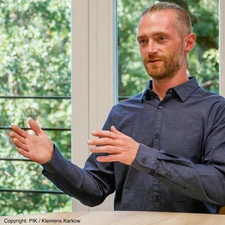Niklas Boers

NP Nonlinear Processes in Geosciences
The 2021 Division Outstanding Early Career Scientist Award is awarded to Niklas Boers for outstanding developments of nonlinear techniques in atmospheric and climate sciences, in particular for extreme events, tipping points, and palaeoclimate dynamics, and leadership in the field.
Niklas Boers is a remarkable applied mathematician and theoretical physicist who has made exceptional contributions to nonlinear and complex system science applied to geoscientific problems. During his doctoral work at the Potsdam Institute for Climate Impact Research (PIK), he developed a methodological framework based on network theory to study the spatial synchronization structure of extreme events on regional and global scales. This framework, which allows one to study weather processes related to extreme events, to predict such events, and to evaluate climate models and their representation of observed extremes, is already widely employed as an alternative to empirical orthogonal functions, which are not suited for extreme events.
During a two-year postdoc at the Ecole Normale Supérieure, Boers held a highly prestigious Humboldt Foundation Fellowship and made important contributions to palaeoclimatic data analysis and modeling and developed sophisticated methods of inference and uncertainty quantification for inverse problems. In particular, he developed a method to propagate dating uncertainties in palaeoclimatic records, discovered early-warning signs for the Dansgaard-Oeschger events during the last glacial interval, and showed that interactions between ice shelves, sea ice, and ocean circulation can explain these events.
In total, Boers has authored more than 30 peer-reviewed research papers, and he is lead author on about half of them. The lead authorship attests not just to having done most of the work but also to being the actual leader of the research. Boers’ works are mathematically creative and sound, and the applications are diverse and of major geoscientific interest.
Since 2019, Boers has lead a junior research group funded via a Freigeist Fellowship by the Volkswagen Foundation at the Freie Universität Berlin, the Future Lab “Artificial Intelligence in the Anthropocene” at PIK, and is a part-time Senior Lecturer in the mathematics department of the University of Exeter. His current research focuses on predicting extremes and abrupt transitions in the Earth system, with an emphasis on combining machine learning methods with process-based models.
For all these major achievements, Niklas Boers is awarded the Outstanding Early Career Scientist Award of the Nonlinear Processes in Geosciences Division.
